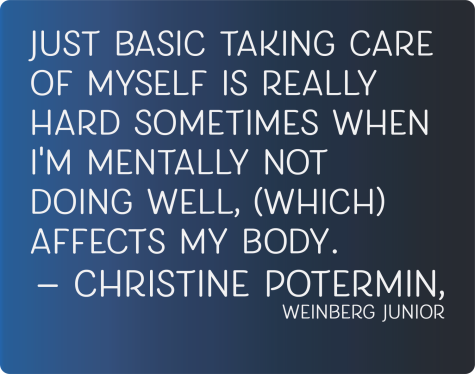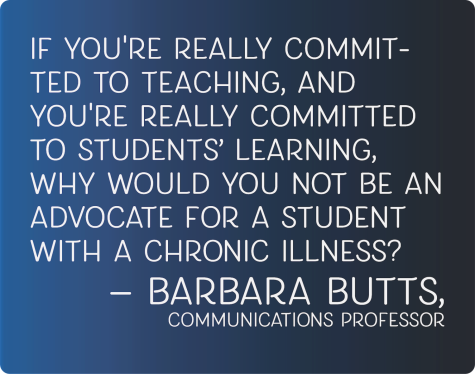In Focus: Students with chronic illnesses feel unsupported by University services - Daily Northwestern
Three weeks ago, as her asthma symptoms flared, Communication and McCormick senior Gillian Finnegan sat in class struggling to suppress a cough. She couldn't focus on taking her exam. All she could think about was whether the students staring at her thought she had COVID-19. And how much longer she could hold in her cough. And if they noticed her labored breathing. She felt like her classmates didn't want her there.
Finnegan tried to prevent this exact situation from happening. In fall 2020, she submitted an application to AccessibleNU, the center that provides accommodations for NU students with disabilities. She asked for flexibility in being late or absent from classes due to her eosinophilic asthma: a rare, severe form of asthma that causes breathing difficulties and coughing fits that can last up to a week.
She waited a year and never heard back, but Finnegan said she wasn't worried. Classes were remote, so she wasn't concerned about rushing across campus, which could prompt or exacerbate an asthma attack.
She tried again over the summer when she found out the University was returning to in-person instruction. This time, ANU did respond — only to refuse her request for accommodations after an intake meeting. Instead, the center asked her to fill out a request form for the third time.
Finnegan isn't alone in needing support from NU.
Associated Student Government's 2019-20 analytics survey found at least 226 students answered "Yes" to the question, "Do you have an ongoing, diagnosed, clinical health issue?" More than 31% of those students said they were registered with ANU.
According to the University's most recent Diversity and Inclusion report, 1,004 undergraduate students are registered with ANU for chronic illnesses and physical, intellectual and psychological disabilities.
Chronic health issues vary in severity, but some students who feel they require accommodations have been left with long wait times or been entirely turned away. The pandemic has worsened these issues, especially for students whose symptoms mimic those of COVID-19 or who are immunocompromised due to their illnesses.
Dismissed and denied
Finnegan said she felt invalidated by her experience with ANU.
Her intense and frequent asthma attacks are aggravated by cold weather and strenuous activities, like working out or even walking across campus. She hoped to receive accommodations that would keep her from being penalized for taking her time to get to class or staying home altogether when her symptoms were flaring up, which can occur multiple times a quarter.
Once she submitted the ANU application a second time, Finnegan was asked for a form filled out by a doctor — a step she said wasn't clear in her first application.
But when Finnegan was finally able to meet with an ANU representative at the end of the summer, she said her experiences were downplayed. At one point, she said the representative compared her condition with their own, less severe experiences with childhood asthma.
"I was sort of second-guessing my symptoms, because they were like, 'Oh, well, I don't really see how this affects your everyday life,' or 'Can't you just take your inhaler? Doesn't that fix everything?' even after I had explained most of why that is not ideal and why I don't want to keep relying on that," Finnegan said.
If her asthma is flaring up, Finnegan may have to use her inhaler multiple times a day or week to feel comfortable getting somewhere quickly. But using an inhaler more often can lead to health issues, including increased heart rate. Her inhalers are also expensive, and using them up faster means having to purchase more sooner.

Finnegan said she doesn't understand the denial since she did have a doctor's note. By ANU's standards, she should be eligible for accommodations; students qualify if they have a "physical or mental impairment that substantially limits one or more major life activities," including walking, speaking, breathing and taking care of oneself.
She was told she could apply again — but on the basis of allergy symptoms related to her asthma, instead of the asthma itself.
"I don't even know if it's worth it at this point," Finnegan said. "It just didn't really feel like they were hearing me."
Long waits and logistical conflicts
Weinberg junior Sam, whose name has been changed due to privacy concerns, was diagnosed in April with Crohn's disease, a type of inflammatory bowel disease. Symptoms of the disease can include abdominal pain, nausea, vomiting, diarrhea, fatigue and loss of appetite.
Sam is on Remicade, a biologic medication that is administered in infusions. He has to sit for a three-hour IV infusion every eight weeks. He also takes six methotrexate pills, a different immunosuppressive drug, once a week.
His symptoms have decreased since starting his medications, but Sam still finds himself running late to class or activities if he needs to use the restroom emergently. He used to be on the track team in high school, but now finds that when he runs, his stomach hurts immediately afterward and he experiences rectal bleeding.
Sam missed four days of Northwestern University Marching Band camp in early September to go home for an infusion. That became a costly disruption to his schedule, because he was unable to schedule an appointment with Northwestern Medicine in time. Since his infusions are on a strict timetable, it is likely he will have to miss other important classes, exams and activities.
He first reached out to ANU in August, hoping to receive accommodations for his infusions and symptom management. He said he was offered an intake meeting three weeks away, but missed it because he didn't realize it conflicted with band camp. Several back-and-forths followed, during which he was offered another meeting but missed the email. Ultimately, he was told to call the office to reschedule, which he didn't do until October.
Once he finally had the meeting in October, Sam said he received early registration accommodations and flexibility for being late to class or excusing himself to use the restroom as needed.
He was unable to receive accommodations before his last infusion appointment, however, which was on the same day as a midterm. Luckily, his professor was accommodating even though he wasn't registered with ANU at the time.
"Part of it was me (forgetting to attend the meeting), but part of it was just that I'm busy (like) any Northwestern student," Sam said. "It's not easy trying to schedule something like that, especially in the beginning of the quarter, when they gave me a date nearly a month out."
AccessibleNU did not respond to The Daily's request for comment. In an email to the Daily, University Spokesperson Jon Yates said ANU does not publicly comment on specific cases "due to the topics and issues being compliance related under civil rights legislation (e.g. Americans with Disabilities Act and Section 504 of the Rehabilitation Act)."
Housing hurdles
Even after being approved for accommodations, students can still face bureaucratic obstacles.
Weinberg junior Natalia Kadolph was diagnosed with McArdle disease when she was 18 years old. The rare genetic blood disorder renders her unable to break down stored glycogen into glucose, leading to muscle fatigue and cramping. She said this can make it difficult to walk long distances around Northwestern's sprawling campus.
"I have to slow down and take breaks because my muscles are cramping in my legs," Kadolph said. "It makes it really hard to go up stairs, so after probably two flights of stairs I can't really go much further because … (My legs) feel like lead."
For her sophomore year, Kadolph received housing accomodations in the form of priority room choice, which would allow her to live on a lower floor and in a dorm with an elevator.
Generally, the person in a group with the lowest priority number can choose a room or suite and pull friends with higher numbers in to live with them. Kadolph planned to do so with her close friends, hoping to live with people who were both aware of her condition and willing to serve as a built-in support system.
"I am not super comfortable with opening up to others and telling them about my condition," Kadolph said in a message to The Daily. "Living with people who already know what I'm going through in regards to my medical condition is really comforting."
But when it came time to arrange her sophomore housing, Kadolph said she was told she couldn't choose her roommates.
Residential Services told her she had to live with University-assigned suitemates because she was only given priority to choose her suite due to her accommodation, she said.
"For me to be accommodated, then I had to lose out on the perks that everyone else has here, to choose their roommates or suitemates," Kadolph said.
The issue was ultimately resolved, but Kadolph said the difficulties caused extra stress. Her parents had to get involved and she had to get a doctor's note saying she needed a support system in her dorm, she said.
Students submit requests based on individual housing or dining needs that often include supporting documentation, Residential Services told The Daily in an email. Requests are then reviewed by Northwestern University Health Service or Counseling and Psychological Services. Residential Services did not directly address Kadolph's experience with losing roommate choice.
In-person courses introduce conflicts
After NU announced a return to in-person classes, students registered with ANU said they don't recall receiving communication from the University regarding support for those who are immunocompromised due to their chronic illnesses.
NU stopped requiring weekly COVID-19 testing for vaccinated students during the 2021-22 academic year. The Weinberg College of Arts and Sciences also said it would not permit remote or asynchronous versions of in-person classes this fall, according to an email obtained by The Daily in August. The email stated that Weinberg would require in-person office hours this fall.
Despite the impact these policies have on students with chronic illnesses who are immunocompromised, they are only granted accommodations to miss class or join remotely if they test positive for COVID-19.
Although Finnegan's immune system is not compromised by her condition, some of her respiratory symptoms are similar to those of COVID-19. She said she wishes remote learning options were open to everyone, not just to those who test positive for COVID-19. That way, when her symptoms were bad, she could focus on class rather than try to suppress her cough, she said.
Weinberg junior Christine Potermin has juvenile rheumatoid arthritis, an autoimmune disease that causes her joint pain, mainly in her hands, wrists, knees and feet. Potermin receives support from ANU in the form of extra-time accommodations for exams and approval to use a laptop in class to take notes.
In order to keep her arthritis under control, Potermin takes five pills each morning and another nine at night, plus an extra five methotrexate pills once a week. Those with autoimmune diseases, like Potermin, are often put on medications that suppress their immune systems to counterbalance the disease.
Potermin said this is why the return to in-person classes deeply affect immunocompromised students. If they get sick, they'll experience much longer and more severe viral symptoms than most people, including from the coronavirus.
As a result, Potermin and her friend group take extra steps to reduce their risk of contracting COVID-19, like frequent testing and only attending small social gatherings.
"A lot of people I know are getting sick," Potermin said. "I'm very concerned (about) that, because if I get a cold I will be in bed for a week."
The mental toll of chronic illness
Potermin has found community in the marching band as part of color guard, but she said her arthritis impedes her ability to partake in long practices.

Before school began, color guard held rehearsals for up to eight hours. Potermin sometimes found herself in a symptom flare during some practices, but she was able to control it with emergency steroids. Her symptoms worsen if she is unable to find time during the academic year to properly care for herself by eating and sleeping well.
"The arthritis has a lot to do with my mental health, and my mental health affects my arthritis, and just basic taking care of myself is really hard sometimes when I'm mentally not doing well, (which) affects my body," she said. "Because chronic pain just makes me feel really down and awful and s–tty."
According to the Centers for Disease Control and Prevention, there is a direct, cyclical correlation between major depressive disorder and chronic illness. Depression can precede chronic illness and chronic illness can also increase symptoms of depression.
Potermin said having a psychologist in CAPS, the University's primary mental health service, with a special interest in mental health issues related to chronic illness would be helpful, especially since the services are free and nearby for students.
CAPS does not report having a practitioner who specializes or has special interests in mental health issues related to chronic illness for the more than 200 students like Potermin managing these medical conditions.
Sam has experienced intense anxiety since a colonoscopy and abscess removal procedure for his Crohn's disease in January. He also has anxiety surrounding his bleeding. When he does bleed, it puts him in a terrible mood for the rest of the day and he fears for the next time it will happen, he said.
He spoke to Northwestern Medicine, where he sees a specialist, about a therapist referral. But Sam said he does not have faith in CAPS to provide therapy specialized for chronically ill students.
"At the root of it, I don't think the University actually cares about CAPS at all," he said. "They just put it there in name so that the University can say it takes initiative on mental health."
CAPS did not respond to The Daily's request for comment.
"Why would you not be an advocate for a student with a chronic illness?"
Feinberg Prof. Rachel O'Conor primarily focuses her research on how older adults self-manage chronic illness, including medication management and social interactions.
O'Conor said she believes providing students with the accommodations they need is important. But she said the University can improve the lives of students with chronic conditions, and the rest of the student population, by thinking bigger.
"Disability occurs if there's a mismatch between a person's ability and their environment," O'Conor said. "It's no longer a disability if the environment is modified so that the person can function within it."
Larger environmental modifications, such as putting elevators in every dorm, would not only decrease the amount of accommodations requested but would also universally benefit all students, O'Conor explained.
O'Conor said these suggested changes could also help remove stigma from the accommodations students need.
Since Finnegan has been unsuccessful in obtaining accommodations from ANU, she has approached some of her professors individually and received mixed responses. She said she will sometimes skip large lecture classes if she's experiencing asthma symptoms and feels like it isn't acceptable to come to class late.

Because her symptoms intensify in the winter, Finnegan said she noticed her Winter Quarter grades in freshman and sophomore year differed from those in her junior year, when she did not miss classes because they were remote. She expects that with ANU's support, she would have a better chance of being taken seriously by professors when asking for leniency in late policies.
Communication Prof. Barbara Butts was one such professor who was willing to provide accommodations without ANU's official support. Finnegan took multiple theatre courses with Butts, who was on the board for ANU for several years and worked extensively on projects that make learning more accessible to students.
"If you're really committed to teaching, and you're really committed to students' learning, why would you not be an advocate for a student with a chronic illness?" Butts said.
Butts is working on a software program alongside AccessibleNU with Glean, a company that aims to bring aspects of remote learning that positively benefited students into the in-person classroom environment. One example is Zoom's chat function, which allowed students to communicate with their class even if they did not feel comfortable being vocal.
While some students may be hard on themselves when it comes to requesting accommodations, Butts said students with chronic illnesses deserve the flexibility they need in order to level the playing field between themselves and their peers.
Butts said speaking up and asking for accommodations can pave the way for future students.
Sam described his Crohn's disease symptoms as either "invisible or really embarrassing." He wishes ANU would go one step further than just publicizing that its services exist. He didn't know what specific accommodations existed that could benefit him, such as flexibility with being late to class or early registration, until his adviser informed him.
While ANU may be accessible to some students, Finnegan said it wasn't to her.
"I just wish the University would make it easier (or) more known what kind of things that they can do," Finnegan said. "Because I didn't even apply to ANU accommodations until … I met somebody else that had an accommodation similar to what I may need. (I didn't know) that that was possible."
Email: [email protected]
Twitter: @ariannacarpati1
Related Stories:
— In Focus: Northwestern theater students receiving accommodations struggle to find accessibility within theater program
— In Focus: With demand for greater accessibility, Northwestern staff, students aim to close institutional gaps
Comments
Post a Comment